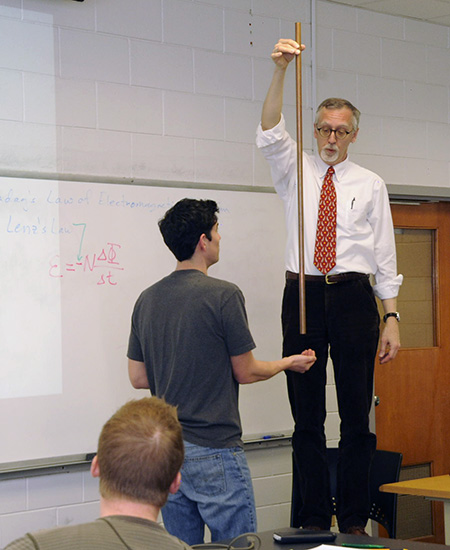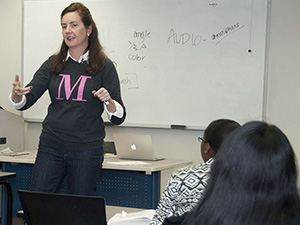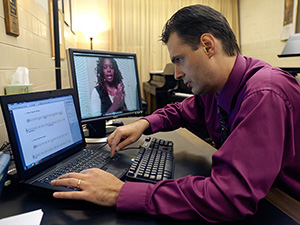
Jim Guinn gets students' attention by actively demonstrating different principles of physics. (photo by Bill Roa)

Mary Helen O’Connor teaches problem solving in her English classes. (photo by Bill Roa)

Slava Prudchenko finds teaching music online an enjoyable challenge. (photo by David Tulis)
Teaching Excellence winners have diverse classroom styles
One is a professor who uses an unconventional approach to teach his students about the laws of physics. Another is an English instructor who has championed refugee students to exceed their own expectations. And a third is an accomplished musician who performs with students via the Internet.
The three Georgia Perimeter College professors are all recipients of the 2014 National Institute for Staff and Organizational Development Excellence awards. They were honored recently by the Texas-based organization that recognizes men and women who have demonstrated an outstanding commitment and contribution to their students and colleagues.
Dr. Jim Guinn
To say NISOD winner Dr. Jim Guinn uses unconventional methods to teach physics may be an understatement. Take his classroom demonstration of the dynamics of pressure and impulse: “I lie on a bed of about 1,200 nails—tip up—and have a board that goes over me, and then Dr. Carl McAllister (Clarkston biology department chair) stands on the board. He then places two concrete blocks on the board—one vertically—and then he hits the top of the block with a sledgehammer.”
Guinn performs this stunt to show his students how the pressure of force is divided by area and how impulse works.
“During this demonstration, there are a number of physics principles that go on,” Guinn says. “And I ask my students, ‘could I do this if there were only one nail on the bed?’ The answer is, absolutely not—it would go right through my back. But by adding more nails, there is less force. And using the sledgehammer to hit the blocks also demonstrates how impulse works over a time period. The amount of time pushing on the block is small; as soon as the block breaks, the force stops, and the impulse is manageable,” he explains, adding that it doesn’t even hurt—much.

Mary Helen O’Connor
Problem solving may sound like a basic lesson in a math course, not an English class. But Mary Helen O’Connor uses problem solving as a life-changing skill for her English students, many of whom are refugees who have fled persecution in their native lands.
“I approach my students—whether they are international students or not—with the best ideas that other teachers gave me along the way. They taught me to be confident and to value learning and independent problem solving.”
That’s a skill she wants to instill in her students. “If you give the students the confidence and ability to solve their own problems, they can do that in any discipline,” she says.
She wants her students to develop competencies not only in grammar and writing, but also in the digital world. Many of her classroom assignments involve creating digital projects linked to reading books or poetry.

Slava Prudchenko
Online music instructor Slava Prudchenko’s parents both were higher education music professors, so it was natural for him to continue the family tradition.
But teaching music online is a bit different. “It is a challenge to recreate the classroom experience in a virtual environment,” he says. “I use instructional video tutorials, recorded instructional exercises such as counting and clapping, podcasting, self-video homework assignments and web video links.”
One of the drawbacks of online is not being able to show students real-time concerts, says Prudchenko. He is working with GPC’s Office of Information Technology on a project to transmit live music concerts to his students.
Prudchenko is constantly striving to improve his teaching. “I listen to what the students have to say in their feedback,” he says. “I am trying to see if I am doing enough or if I am clear enough. It helps me strategize my efforts to make my online classes easier to navigate, better structured and more comprehensive in the content area.”
